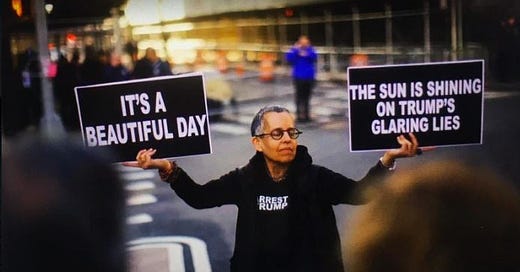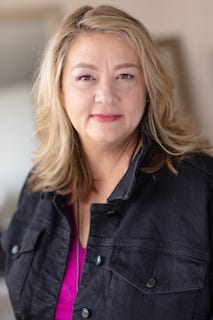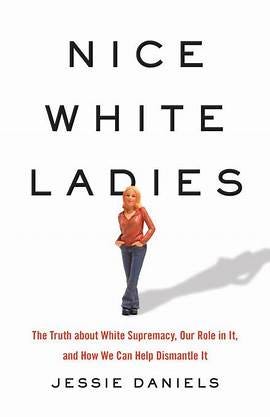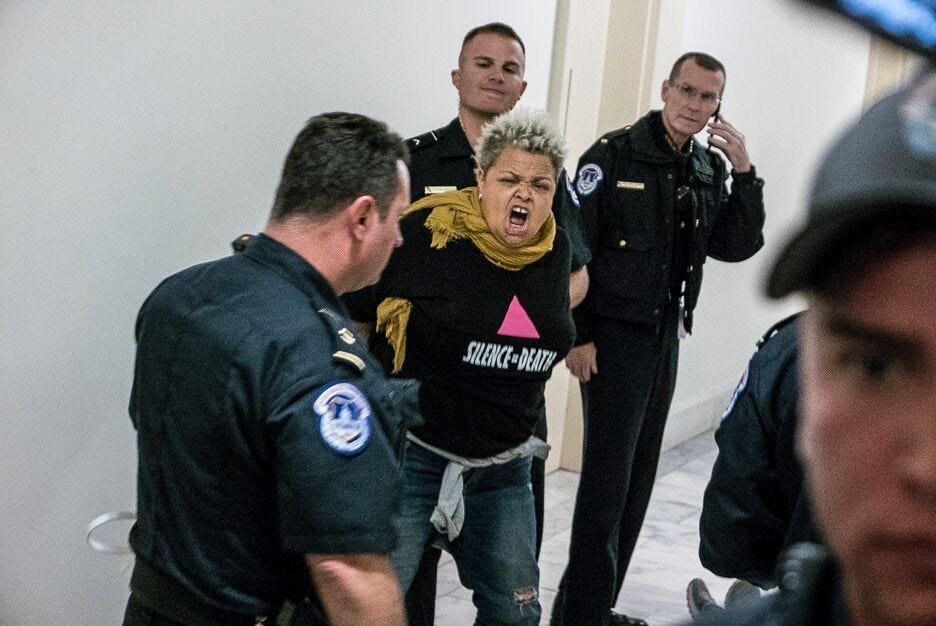Unfinished Business - Pt 2. A Spotlight Conversation with feminist scholar-turned-anti-racist activist Jessie Daniels
More on whiteness, wokeness, and the unfinished business of tilling America’s racist soil-- and why public sociology turns her on.
Public Sociologist-cum-scorched earth, root-out-the-white-surpremacy-rot, acivist Dr. Jessie Daniels. Photo: Jessie Daniels personal archive.
PART 2 (of 2) (Note: For Part 1, see main page of Tell Me Everything SubStack.)
That summer I took my first class in sex roles and sociology, Jessie recalls of the period after her mother died. I remember reading the whole book in the first week and going, ‘oh My God, I have been lied to...’ She had a feminist awakening after reading an excerpt by the late Carol B. Christ, a feminist theologian and historian some view as the foremother of the Goddess movement. The men who’d established the canon of the Bible had deliberately left women out, she learned. Lies! The betrayal! Jessie adds, laughing at her newbie feminist self.
She’d started out as a Spanish, English and History major and dropped them all to major in sociology, because sociology answered questions that humanities could have answered but I didn’t have enough cultural capital to understand…I needed data. She found a great mentor in Dr. Joy Reeves, then-head of the school’s sociology program, who pushed her toward graduate school. She was still toying with law school, and first spent a gap year working for a law firm in Austin, her new home. Then she started grad school and discovered the historical records of Ida B. Wells, written in Wells’ own hand. She didn’t look back.
I was just fascinated by that, and struck by it, Jessie says. At the end of that semester, her teacher taught a final unit called New Frontiers, about the emerging cutting edges of research. It was on something called Intersectionality which was a new term at the time, and the point of it was to look at race, gender, and class all at the same time, says Jessie. I was just a fascinated that we could do all those at once. And I remember asking the professor why more people didn’t do intersectionality, and she just looked at me and said, ‘because it’s hard!’ She laughs. That didn’t dissuade me; that just challenged me.
Jessie landed a job with scholar Joe Feagin, and took a deep dive into the literature on race. She began transcribing interviews with some of the 200 middle-class African-Americans respondents that make up Feagin’s book Living with Racism: The Middle-Class Experience (by Feagin, with Melvin P. Sikes; Beacon Press, 1994). The work changed her. Going in, she’d held an unexamined liberal bias about Black complaints of everyday racism, she says; she’d been dismissive. Digging deeper, she realized they are not complaining; they are minimizing what they are coping with…this continual racism. It was a profound experience for me.
Jessie had found her life’s work – at least its familiar soil. Sociology offered her tools to look at the problem of embedded, systemic racism, and its overlap with gender, and with poverty – with all the issues she’d seen up close in her own life, growing up in Texas. Her first book, White Lies, grew out of her dissertation. In it, she examined extremist literature, from the Klan and David Duke publications, to Pat Buchanan’s rhetoric, arguing that, there is a Venn diagram between the mainstream and the extreme and they overlap in ways most of us don’t consider ourselves white supremacists find uncomfortable.
Nice White Ladies, a primer on how to be not-so-nice about white supremacy.
Fast forward to last Tuesday, to the rising power of new white ladies like Marjorie Taylor Greene and unrepentant liars like George Santos. Part of what’s happened since 1997 is that that Venn diagram has become almost a closed circle, Jessie feels; the connections between the extreme and mainstream have just collapsed on each other. She cites a recent example, when Lesley Stahl of 60 Minutes-- ancient legacy media, Jessie calls it – invited Greene to her primetime CBS show. The interview was framed ‘from the fringe to the front row,’ Jessie says, but that pushes it right to the middle.’
One of the problems she’s grappling with as a scholar is the shifting conversation. I increasingly think our language on racism is not up to the task of what we are facing, she says, citing a fresh example. Just today, Marjorie Taylor Greene was comparing the man who was just indicted to Nelson Mandela and Jesus Christ, which is laughable on the face of it, but we ignore that kind of rhetorical strategy at our peril.
She’s also worried about the strategic linkage of whiteness to extremist views that aren’t racial on the surface. There are people who have so wedded their white identity to certain political policies that those are inseparable, she explains, fingering hardcore Trump supporters, the January 6 coup supporters. Guns are one of the top [things] on that list; Obamacare, or ACA, is also on that list.
Under Trump, whiteness has become an effective rallying cry, a radicalizing agenda. I think there’s been a kind of spreading out of the places where white identity attaches, Jessie adds. It used to be mostly [based on] class; now it’s also on guns…abortion…trans issues. That’s the part that is most challenging now.
Rise and Resist’s Laurie Arbeiter, keeping it real, on the scene of Donald Trump’s arrest. APhoto: Ahmed Gober for the New York Times. April 4, 2023.
The other tricky shifting terrain is wokeness, which the far-right has seized on as a strategy to attack not only liberals but vulnerable communities including transgender Americans. That’s also why she finds the work SURJ is doing so helpful in focusing progressives on the how-to’s of tackling and unpacking systemic racism. Having an awareness of one’s position as a white person is but a first step. Within SURJ, she explains, they set aside the framework of white privilege and say, ‘yeah, but that is not an organizing strategy.’ The question to be asked is, what is the shared interest here? The work calls for examining issues; the goal, repairing harm.
Stop Cop City: the new rallying cry of grassroots activists in Atlanta. Photo: Atlanta DSA.
When I ask her about activism she admires now, Jessie points to Stop Cop City, a coalition of young, Black and Eco activists in Atlanta. She was just there, listening to how climate change and Defund the Police (DTP) activists are mobilizing to stop development of the Atlanta Public Safety Training Center, nicknamed Cop City, to be built on 85 acres of forested area on the city’s outskirts and used to train law enforcement and fire department service workers. City officials who support the project say it’s designed to raise low police morale and build police recruitment and retention. Critics say it will further militarize police and endanger communities, pointing to Israeli police being recruited to train Atlanta cops. The $90 million project is expected to open its first phase later this year.
To stop them, the activists are saying, ‘this is going up in a forest, we are going to protect this land,’ says Jessie. Their resistance, she adds, gives me great hope and great trepidation, reflecting some of most promising kinds of activism she’s encountered. But, she adds, it’s also kind of heartbreaking. Dozens of people were arrested in early March for throwing rocks, fireworks and Molotov cocktails at officers near the Stop Cop building site. There are Stop Cop City activists now sitting in Dekalb County jail facing domestic terrorism charges, which can carry a 25-year sentence. It reveals the kind of shaky advantage of labelling something domestic terrorism because it ends up being used against activists, Jessie warns. She’s referring to the domestic terrorism charges used to prosecute pro-Trump January 6 coup plotters and other far-right extremists who’ve attacked, injured and killed Black Lives Matter activists.
All of this is part of the shifting and hardening political landscape that underlies the fight to unearth white supremacy in America in 2023.
Putting Theory into Practice
Looking back, I ask Jessie what she’s most proud of and the answer is, her most recent book, because it’s her most personal work to date, and she put herself under the microscope, too. She also did something academics don’t usually do, but her editor urged her to include it, which was an appendix of tools and movement strategies to address white supremacy. She’s come to embrace public sociology, which is aimed at reaching a general audience, not only fellow academics. She writes for both audiences, depending on the subject. But increasingly, she’s grown comfortable wearing her activist’s hat.
As a scholar, she explains, she’s interested in data analysis and identifying patterns. and in theory; sociology offer tools to track and understand the shifting currents of political movements. But as a public sociologist and activist, she wants to put that theory into practice to affect concrete change. For me there is a real synergy, in the streets and in the more theoretical work, she explains. That’s the approach she took in her first days of activism back in college in Austin, where she joined campus anti-apartheid protests while reading a book about white supremacy by George Fredrickson.
Activism makes for a good life, she adds, quoting the advice she got from another role model, Frances Fox Piven. I think that was such good advice, especially as I just turned 61. As I get older, what do I want my life to look like? I want to be more of an activist which includes writing books, but also being in the streets.
That said, she’s most interested in solutions these days. While sociology offers great tools for analyzing social problems, she wants sociologists to apply themselves to identifying solutions, too. We urgently need that, she says.
Amanda Lugg in action. Photo: Jessie Daniels personal archive.
She’s also invested in community, which she’s found at home, with her partner. I am constantly admiring Amanda, she says of Lugg, a longtime ACT UP activist who also engaged in anti-apartheid organizing. Lugg is also the Executive Director of African Services Committee in Harlem, a HIV services agency. I think I partly fell in love with her based on a picture of her as an activist, Jessie adds. [We met on a panel we’d both been invited to] and she was doing her talk, and she included a picture of herself being arrested in DC, with a great ACT-UP T shirt. She was protesting the cuts to ACA, and I just thought, ‘swooon’… She sighs, laughing. I have that picture framed and it’s in our apartment.
Reflecting on her journey, she adds, I feel like the turn toward activism is such a relief from individual isolation, that feeling that I had to do it all for myself. I think the most exciting thing to me, as somebody who was raised white in a super isolated way, is the promise and joy of real community with other activists. That is the real sauce right there. I see that in my partner’s life as well. She has really wonderful, deep, friendships with other dykes who are activists and those are some of the meaningful relationships of her life. I think that is super cool and inspiring.
[END]
To learn more:
https://www.jessiedaniels.net/
Jessie’s Substack:
A recent review essay on Artificial Intelligence, whiteness and the far right: The Manifest Destiny of Computing
The books:
White Lies (Routledge, 1997)
Cyber Racism (Rowman & Littlefield, 2009)
Being a Scholar in the Digital Era (with Polly Thistlethwaite, Policy Press, 2016)
Digital Sociologies (edited with Karen Gregory, Tressie McMillan Cottom, Policy Press, 2016)
Going Public: A Guide for Social Scientists, (with Arlene Stein, University of Chicago Press, 2017)
Nice White Ladies (Seal Press, 2021)
Audio narration of the book (read by JD)









